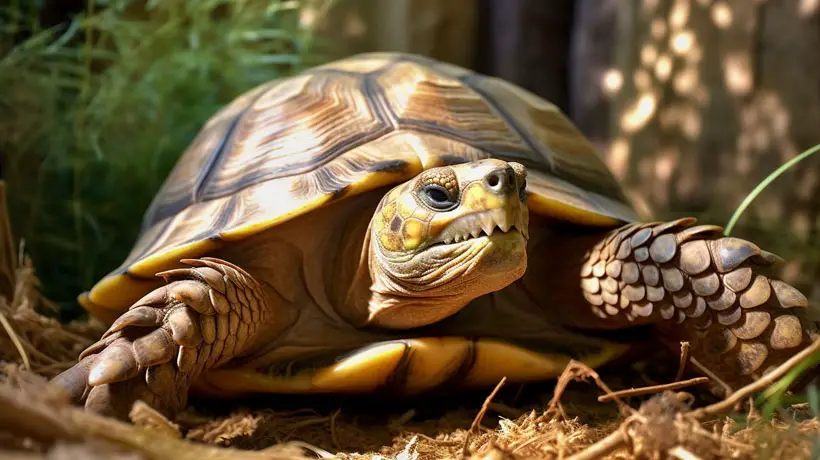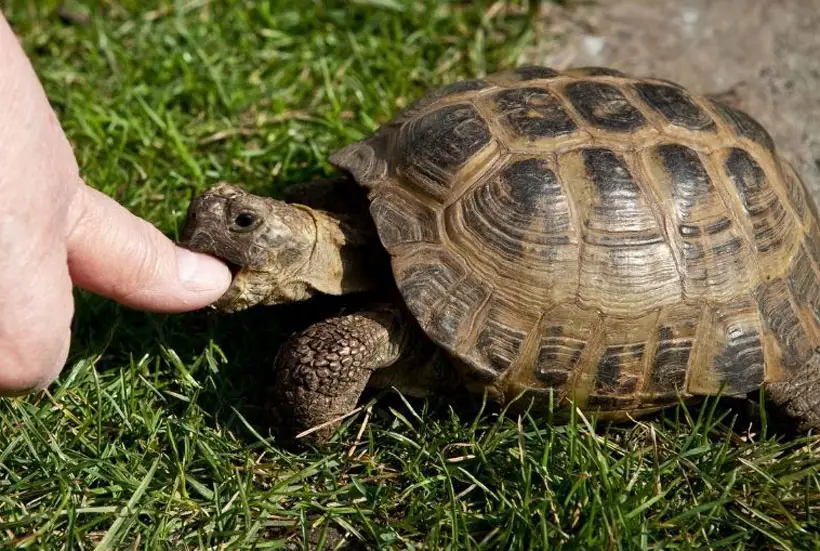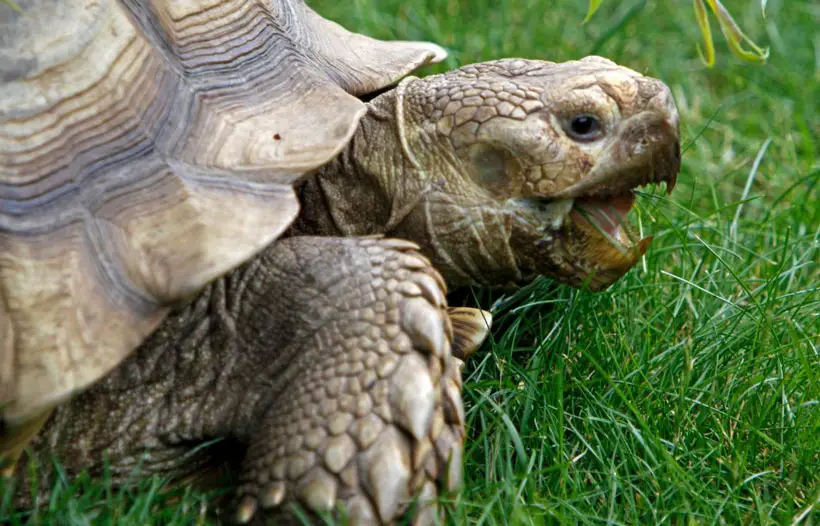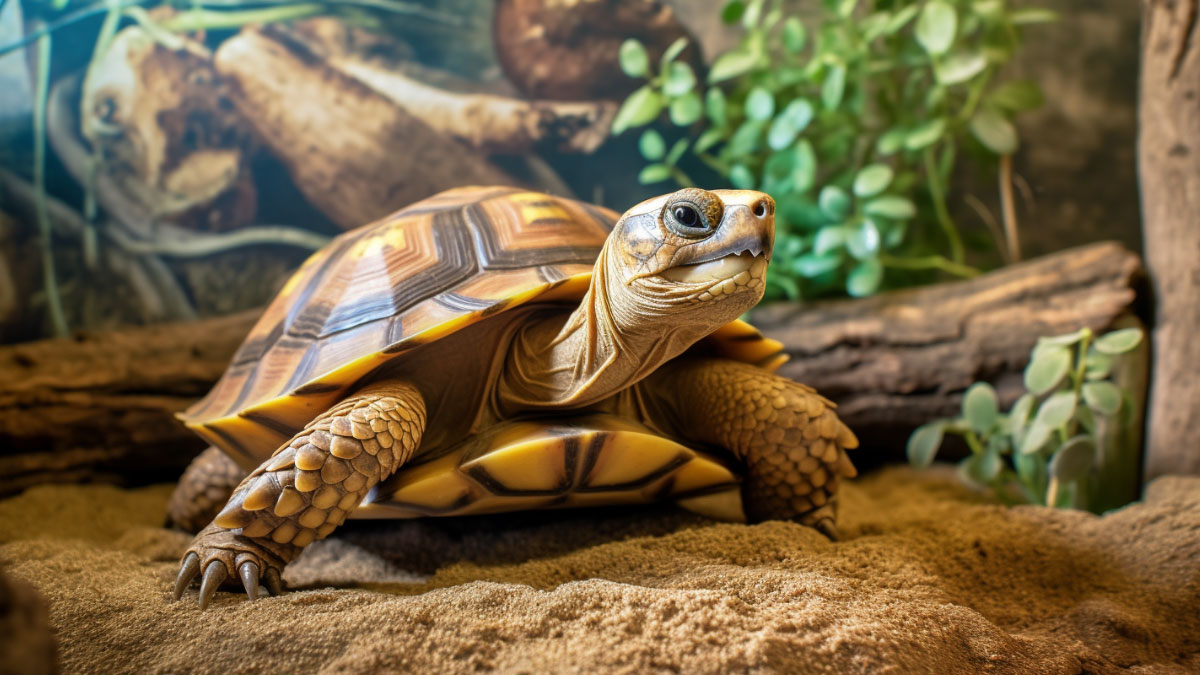Do Tortoises Have Teeth? Find Out The Truth!
The diet and eating habits of animals can change due to the presence or absence of teeth. Thus, in the case of tortoises, you also consider if they have teeth or not and need to take care of them accordingly.
So, do tortoises have teeth? No, they have strong, sharp, or ridgy beaks instead of teeth. Typically, they depend on their beaks to cut, split, grind, or break down their food. Significantly, with their diet, the types of beaks will also vary slightly.
Throughout this article, we will discuss the types of their beaks and how they eat foods without teeth. Besides, you will also know how dangerous their bite could be. Thus, keep reading.
Do Tortoises Have Teeth?
Contents
No. They don’t have any teeth; instead, they have beaks. Interestingly, all tortoises are generally born with teeth, which you can call egg teeth. Those teeth are not as strong as real teeth.
Typically, those egg teeth are made of keratin and drop shortly after birth. They use their egg teeth to tap on the egg surface to crack the eggshell and come out. As these teeth aren’t permanent, you can give less importance to these egg teeth.

Instead, let’s know more about the beaks of the tortoises, which differ from tortoise to tortoise depending on their diet.
Herbivores
Most tortoises, like Radiated tortoises, Desert tortoises, leopards, Galapagos, and Seychelles giant tortoises, etc., are herbivores. Therefore, these tortoises will depend on plants, fruits, and vegetables for food. Thus, rather than sharp beaks, they will need beaks that will be strong enough to bite those plant matters.
Carnivores
Carnivore tortoises need to pierce through the meat chunks; hence they will need sharp beaks. Generally, their beaks contain multiple sharp edges to cut through their food.
You will find spikes in the mouth of sea turtles species like green turtles (Chelonia mydas), loggerheads (Caretta caretta), and leatherbacks (Dermochelys coriacea). That’s because their diet mainly contains jellyfish, which can sting badly. Thus, those turtles have these dangerous features to avoid stings.
Omnivores
Generally, hinge-back tortoises, elongated tortoises, red-footed tortoises, and yellow-foot tortoises are omnivores. These types of tortoises eat both plant and animal matter. That’s why they will have sharp, pointy, and strong beaks.
How Do Tortoises Eat Their Food?

As they don’t contain any teeth, their eating process will be quite different from those animals who have teeth. Generally, the most significant difference is they can’t chew their food; instead, they will swallow their food as a whole. Here’s an idea about how they eat without the presence of teeth:
- The front part of their beaks acts to cut and lacerate the food, whereas the hind portion acts to grind down the food.
- Their Salivary glands release saliva, which smoothens the texture of the food and makes the swallowing process easier.
- Also, their facial muscles incorporate neck and jaw muscles and make a complex system. These muscles work together to provide enough force to break and split the food into small pieces.
- Their upper beak contains a powerful plate-like feature that they use to crush the robust shell of crustaceans.
- Tortoises have adaptive digestion systems to break down and digest fiber-rich foods.
Can Tortoises Bite?
Yes. They can bite even though they don’t have teeth. Mainly, their beaks are strong enough to cause great pain when they bite you. Unfortunately, there are no solid studies about their biting force. But a snapping turtle may deliver 1,000 psi through their bite, which is dangerous.

Typically, the male tortoises may bite the female ones as one of their courtship behaviors. Alongside, they may also bite their owners or caregivers unintentionally while eating food.
The intensity of their bite will significantly depend on their food habits and sizes. We already mentioned that the carnivore ones have sharper beaks and pointed edges than the herbivore ones. Carnivores’ bite will be more dangerous than the herbivore ones.
Also, the size of the jaw of a tortoise will grow with its increasing size. Hence, the force they will apply through their jaw will also increase. That’s why their bite can just cause slight redness on the skin if they are tinny.
But, if their size is huge, they can even create open wounds to amputate your body parts.
You can check this video to understand tortoises’ biting ability more:
Did The Tortoises Ever Have Teeth?
Yes. The ancestors of modern tortoises used to have teeth in both their lower and upper jaws. Many prehistoric specimens or fossils are proof of this fact.
But why don’t they have teeth now? They went through evaluation to adapt themselves well to the changing environment. Researchers assumed that those teeth containing tortoises got instinct in the Late Triassic era.

Before that period, tortoises’ food source might have been so scarce that they might have had to consume harder food. Thus, for digestion if those harder food teeth were needed for them to survive. As over time, their diet list filled with relatively softer foods, their mouth features also changed into keratinous beaks rather than solid teeth.
FAQs
In this FAQs section, we will answer a few most familiar questions about tortoises’ teeth.
The beaks of these reptiles have ever-growing characteristics, and if overgrown, they can cause problems in their eating. Besides, they will also face difficulties in going inside their shell.
If their beak is overgrown, you must file or trim them to reduce their suffering. When the overgrowth is much, you better consult a veterinarian for safe trimming or filing of their beaks.
If your pet reptile is meat-eating, its bite may cause infection. Generally, those meat-eating ones carry salmonella, which can transmit through their mucus into your wide-open wound.
Conclusion
Tortoises are capable of biting foods using their pointy and sharp beaks. But do tortoises have teeth? As their beaks are strong enough to help them break down their food, they don’t develop any teeth.
During birth, all tortoises contain egg teeth, which drop within a couple of days or weeks. Thus, they aren’t their actual teeth. Moreover, their beaks can overgrow, which may cause them severe suffering; that’s why you need to take proper care of their beaks.

